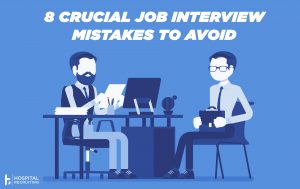8 Healthcare Job Interview Mistakes to Avoid was originally published on HospitalRecruiting.

As you navigate your career path in the fast-paced and ever-evolving healthcare industry, the job interview remains a consistent key to success. But too often, qualified candidates stumble and make common interview mistakes that hinder their progress. By identifying and understanding these pitfalls, you can elevate your interviewing prowess and secure the job you’ve been striving for.
1. Failing to Research the Organization
This mistake can signal to your prospective employers that you need more initiative or enthusiasm. By extensively researching the organization, you demonstrate a proactive approach and show that you have taken the time to understand its goals, achievements, and culture. They are part of a broader healthcare system and local community. Exploring how they interact with these environments can provide critical talking points during your interview.
2. Neglecting to Prepare for Behavioral Questions
Behavioral questions are designed to uncover how you’ve handled specific situations in the past, providing insight into how you might perform in the future. In the healthcare industry, with its dynamic and often high-stakes environment, these questions carry significant weight. Practice using the STAR method to present comprehensive, thoughtful answers. Remember to mention the Situation and Task briefly, but focus more on the Actions you took and the Result that ensued. This approach ensures you effectively convey your problem-solving process and critical thinking abilities.
3. Not Asking Insightful Questions
When you fail to ask questions during an interview, you risk coming across as uninterested or unprepared. Good questions reflect your desire to fit into and grow within the organization. For example, asking about opportunities for professional development shows your ambition and eagerness to learn. Inquiring about team dynamics and culture illustrates your readiness to collaborate and contribute positively to the work environment. Insightful questions can make you more memorable to interviewers and demonstrate your serious intent to join their team.
4. Underestimating Soft Skills
Healthcare is an inherently human-centered field, requiring more than technical know-how. Empathy, patience, teamwork, and excellent communication skills can all significantly impact patient outcomes. Therefore, emphasizing these soft skills is a significant interview mistake. Discuss situations where you’ve used these skills to navigate challenges or improve patient care. This gives interviewers a glimpse of how you’ll interact with colleagues and patients and how you’ll fit into the company culture.

5. Not Following Up Post-interview
Following up shows professionalism and genuine interest in the position. A brief thank-you email is an opportunity to reiterate your interest in the job and your appreciation for the interviewer’s time. This message can also remind you of your qualifications, especially if you reference a specific part of the conversation emphasizing why you’re a strong candidate.
6. Misrepresenting Your Abilities
Some candidates may exaggerate their skills or qualifications to impress. But integrity is paramount in the healthcare industry. If your misrepresentation comes to light, it could cost you the job and damage your professional reputation. If you lack a skill, demonstrate your learning agility by discussing how you’ve picked up new skills in the past.
7. Exhibiting Poor Body Language
Your body language is under scrutiny from the moment you arrive to the interview. Poor body language can unintentionally communicate disinterest, discomfort, or lack of confidence, even over video. Positive body language, such as maintaining eye contact, sitting up straight, and active listening, can help you make a strong first impression.
The digital platform can sometimes make interactions feel impersonal or disconnected, but by consciously utilizing these physical cues, you can project confidence and enthusiasm for the role. Also, remember to be mindful of your surroundings; a clean, uncluttered background can contribute to a professional image.
In a remote interview, there’s no handshake, but you can use verbal cues to compensate. Starting the interview with a friendly greeting and ending with sincere verbal thanks can set a positive tone and leave a lasting impression.
By practicing these virtual cues, you’ll be well-prepared to excel in your healthcare job interviews, whether in person or remotely.
8. Speaking Negatively About Past Employers
Regardless of past experiences, speaking ill of previous employers during an interview is highly unprofessional. Such behavior could lead interviewers to question your teamwork and conflict resolution skills. Instead, steer the conversation towards the positives of your previous roles, emphasizing the skills you acquired, the challenges you overcame, and the growth you experienced.
Conclusion

Navigating a job interview in the healthcare sector might seem daunting at first, but avoiding these common mistakes can significantly improve your chances of success. Preparation is key, but being authentic, personable, and confident is equally important.
As you continue your career journey, remember that each interview is a learning opportunity. After each interview, take stock of what went well, note areas for improvement, and move forward with your newfound wisdom. With dedication and strategic action, you will find the right fit and make meaningful growth in your healthcare career.
**Editor’s note: For more resources on what NOT to do during an interview, check out our article on The 9 Don’ts of Interviewing**


